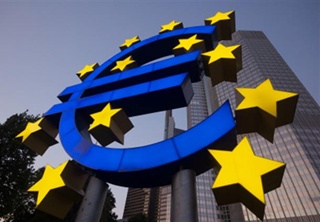Euro-area recovery fails as economies shrink
16 May 2014
The euro-area recovery failed to gather pace last quarter, with France stalling unexpectedly and as economies from Italy to the Netherland to shrank, Bloomberg reported.
 Growth of just 0.2 per cent for the currency bloc, which was half that forecast by economists had increased pressure on the European Central Bank to deliver stimulus measures next month in its battle against weak inflation and anaemic output.
Growth of just 0.2 per cent for the currency bloc, which was half that forecast by economists had increased pressure on the European Central Bank to deliver stimulus measures next month in its battle against weak inflation and anaemic output.
Even with the German expansion doubling to 0.8 per cent, a renewed weakness across the region, including a 0.7 per cent drop in Portugal continued to hurt the region's economy.
ECB president Mario Draghi sounded out investors last week for further stimulus in June, saying the 24-member Governing Council was ''comfortable with acting'' next month.
In the backdrop of the weak recovery from a record-long recession officials continued to battle to revive price growth, with the inflation rate at less than half the ECB's target.
Bloomberg quoted Richard Barwell, an economist at Royal Bank of Scotland Group Plc in London as saying, the recovery was still more or less in train in most countries, but the headline number was disappointing and the horror show was the Dutch number. He added it was expected that the ECB would act in June and it would be a package of measures.
Meanwhile, the dollar was down today with falling US yields on some downbeat economic news, even as the euro was down to 11-week lows against the yen and greenback.
The fall in the euro came on muted euro zone growth and inflation data that lent support to the possibility the European Central Bank would ease monetary policy at its meeting in June.
Benchmark Treasuries yields were down to less than 2.50 per cent to their lowest levels since October on news that US factory output was down to its steepest rate in over 1-1/2 years in April and an unexpected fall in a gauge of US home builder sentiment, casting a shadow on encouraging data on regional factory and jobless claims.
Reuters quoted Shaun Osborne, chief foreign exchange strategist at TD Securities in Toronto, as saying yields just collapsed and the dollar was rising in reaction to it.
The dollar was also hurt by a sell-off in Wall Street stocks. The Standard & Poor's 500 index, SPX was down 1 per cent.
The dollar fell 0.33 per cent against the yen at 101.53 yen after it hit a session low of 101.30 yen, its lowest in two months.



















